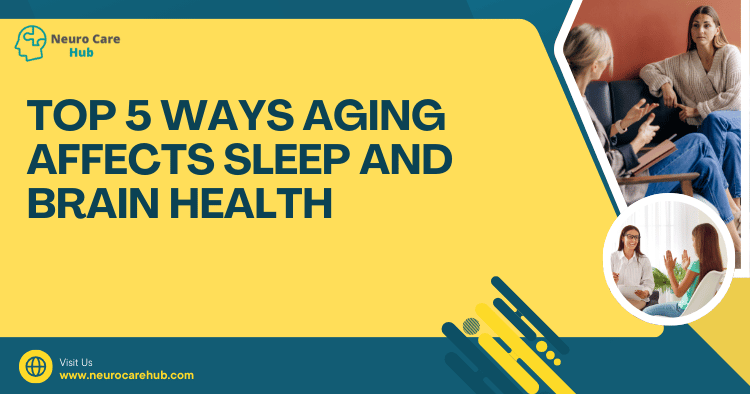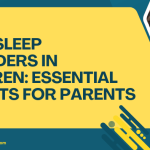Table of Contents
- Introduction
- 1. Changes in Sleep Patterns
- 2. Increased Risk of Sleep Disorders
- 3. Cognitive Decline and Sleep Interrelation
- 4. Hormonal Changes
- 5. Lifestyle Factors and Sleep Hygiene
- Conclusion
- FAQs
Introduction
As we gracefully age, our bodies undergo numerous changes, particularly affecting our sleep and brain health. Understanding how aging impacts these vital aspects of our lives is crucial to maintaining overall well-being. In this article, we’ll explore the top five ways aging affects sleep and brain health, providing insights that can help you optimize your health as you age.
1. Changes in Sleep Patterns
Sleep is not a one-size-fits-all experience, and as we age, our sleep patterns can shift dramatically. Older adults often find themselves waking up more frequently throughout the night and spending less time in deep sleep. Research indicates that the amount of time spent in rapid eye movement (REM) sleep also diminishes, which is vital for memory consolidation and emotional regulation.
“Sleep is essential for memory consolidation, emotional balance, and overall cognitive health.”
Key Changes
| Age Group | Average Sleep Duration | Deep Sleep Percentage | REM Sleep Percentage |
|---|---|---|---|
| Young Adults | 7-9 hours | 20-25% | 20-25% |
| Older Adults | 6-8 hours | 10-15% | 15-20% |
These changes can lead to a feeling of unrest despite adequate sleep duration, resulting in daytime sleepiness and decreased cognitive performance. For additional insights on how to manage sleep as you age, check out Top 5 Tips to Improve Your Sleep Hygiene.
2. Increased Risk of Sleep Disorders
Aging increases susceptibility to various sleep disorders, including insomnia, sleep apnea, and restless leg syndrome. Insomnia, characterized by difficulty falling or staying asleep, affects nearly half of older adults at some point in their lives.
“Understanding sleep disorders is the first step to improving sleep quality.”
Sleep Apnea
Obstructive sleep apnea is particularly prevalent in older adults, where breathing pauses during sleep can lead to fragmented sleep and decreased oxygen levels. This condition not only disrupts sleep but can also contribute to long-term cognitive decline.
Solutions
Addressing these disorders early on is crucial. Seeking medical advice and considering sleep studies can provide tailored solutions to improve sleep quality. For more on sleep-related concerns, refer to Top 5 Sleep Disorders and Their Effects on Brain Health.
3. Cognitive Decline and Sleep Interrelation
The relationship between sleep and cognitive health is a two-way street. Poor sleep can exacerbate cognitive decline, while cognitive issues can disrupt sleep. Research has shown that conditions such as Alzheimer’s disease are closely linked to sleep disturbances.
“Quality sleep is a cornerstone of cognitive health, especially in older adults.”
The Science Behind It
Sleep is essential for clearing toxins from the brain, including beta-amyloid plaques associated with Alzheimer’s. A lack of restorative sleep can hinder this process, leading to increased risk and faster progression of cognitive decline. For more information on brain health, see Top 5 Benefits of Regular Neuro Check-Ups.
Recommendations
To maintain brain health, prioritize sleep hygiene practices such as:
- Establishing a consistent sleep schedule
- Creating a restful sleep environment
- Limiting screen time before bed
4. Hormonal Changes
Aging is accompanied by hormonal shifts that can significantly impact sleep. For instance, a decrease in melatonin production can lead to difficulties in falling asleep and maintaining sleep.
“Hormonal changes in aging can disrupt sleep patterns, making it essential to recognize and address them.”
Menopause and Sleep
Women experience significant hormonal changes during menopause, often resulting in hot flashes and night sweats that can disrupt sleep. Conversely, men may experience decreased testosterone levels, which can also affect sleep quality and overall mood.
Managing Hormonal Effects
Lifestyle changes, such as regular exercise, a balanced diet, and stress management techniques, can help mitigate these hormonal impacts. Consulting with a healthcare provider about hormone replacement therapy may also be a beneficial option for some. For further details on lifestyle changes, refer to Top 5 Lifestyle Changes for Better Neuro Health.
5. Lifestyle Factors and Sleep Hygiene
The cumulative effects of lifestyle choices can have a profound impact on sleep and brain health as we age. Factors such as diet, physical activity, and social engagement play crucial roles in maintaining both good sleep and cognitive function.
“Healthy lifestyle choices are the key to enhancing both sleep quality and cognitive health.”
Healthy Lifestyle Tips
- Nutrition: A diet rich in antioxidants, omega-3 fatty acids, and vitamins can support brain health. Foods like berries, fish, and leafy greens are excellent choices.
- Exercise: Regular physical activity has been shown to improve sleep quality and enhance cognitive function. Aim for at least 150 minutes of moderate exercise weekly. Explore Top 5 Exercises to Boost Your Neurological Health.
- Social Connections: Staying socially active can help stave off cognitive decline and promote overall well-being. Engage in community activities or maintain close ties with family and friends.
Conclusion
By understanding how aging affects sleep and brain health, we can take proactive steps to mitigate these impacts. Embracing healthy lifestyle choices and being aware of the changes our bodies undergo can lead to a more fulfilling and vibrant life as we age.
FAQs
Q: How much sleep do older adults need?
A: While individual needs vary, most older adults require 6-8 hours of sleep per night.
“Quality sleep is vital for overall health, especially as we age.”
Q: What are the best practices for improving sleep quality?
A: Establish a consistent sleep schedule, create a relaxing bedtime routine, limit caffeine and screen time before bed, and ensure your sleep environment is comfortable.
Q: Can sleep medications help older adults?
A: While sleep medications may be beneficial in certain cases, they often come with side effects. It’s essential to consult with a healthcare professional before starting any medication.
Q: Is napping beneficial for older adults?
A: Short naps (20-30 minutes) can be beneficial for older adults, helping to reduce daytime fatigue and improve cognitive function, but long naps may disrupt nighttime sleep.
For further reading on sleep and aging, you can check out National Institute on Aging.
By understanding these five key factors, we can enhance our sleep quality and brain health, ensuring a healthier and happier aging process. For additional insights into neuro care and brain health, visit Neuro Care Hub.






